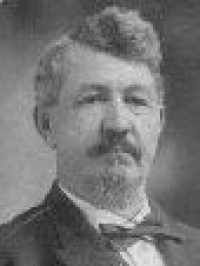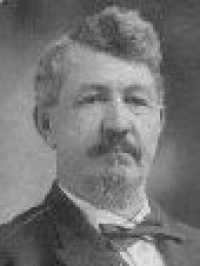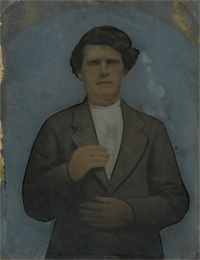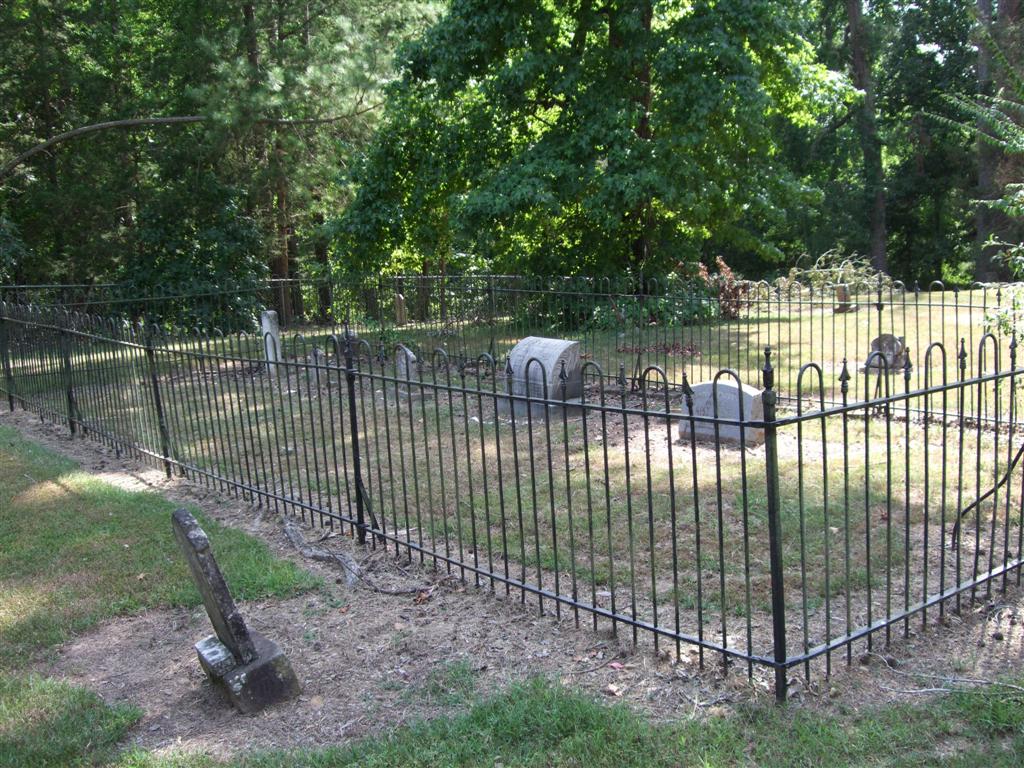Enoch is described (on his declaration for original invalid pension dated 13 August 1883) as being 63 years old, a resident of Perryville, Arkansas, sergeant enrolled on August 1862 [Fold-33 states he enlisted as a private 7 August 1862] in Company G, 8th Regiment, Missouri Cavalry, Vols commanded by Col. Geiger [Washington F. Geiger]; height 6'1", fair complexion; dark hair; blue eyes.
According to the book, "Forward from Rebellion," by John L. Smith, he was in a cell with Elisha Baxter. (They had both been taken prisoner by the Confederate Army and imprisoned in Little Rock.) Baxter believed he was to be executed on August 25. On that morning, Susan Vance came to the door of the dungeon, turned the key and motioned for them to come out (without saying a word). It seems she had stolen the keys from the guard. In this manner, Susan helped her husband escape from a Confederate prison and helped the future governor of Arkansas, Elisha Baxter, escape. [Fold-3 states he was held prisoner until he was liberated by the Union capture of Little Rock 10 September 1863 which is incorrect per numerous sources.]
***
An Interesting Narrative.
The History of a Loyal Arkansian
...
Adventures.
From this time forward his life was a continued series of desperate adventures and hairbreadth escapes - a thorn of unusual magnitude in the side of the rebellion, until, in the latter part of 1862, he fell into the hands of the rebels. In company with Judge Baxter, afterwards elected to the United States Senate by the first legislature of the reconstructed state, he was thrown into jail at Little Rock, and his fate was considered as settled.
His sufferings from close confinement, in irons, in a narrow cell, through the hot days of a southern summer, were needlessly aggravated by petty personal enmity, and the brave old man will carry to his grace, the deep scars left on his limbs by the rusty shackles which he wore on wrists and ankles for so many weary months. At last, by an ingenious stratagem of his wife, a woman worthy of such a husband, he escaped from prison, and lay for five days hidden in a cornfield, living on the ears of green corn. He was at least aroused from his hiding place by the drums of the advancing columns of our forces under General Steele, and with them, among the foremost, he reentered the city of his captivity. [from the Wheeling Daily Intelligencer, Saturday, January 12, 1867, page 2, taken from the New York Evening Post]
***
Enoch then enlisted in the 4th Arkansas Union Cavalry 6 December 1863 and became a captain. His company was hated by the citizens of Saline County, Arkansas . There is also a family story (from my mother's family line), that says his company was responsible for the burning of the house that my maternal great-great--grandmother, Nancy Brown Fletcher, lived in. Whether that story is true or not, is unknown.
After the war was over, Enoch went back to his farm in Saline County. He was nominated for governor of Arkansas by the Republican State Nominating Committee but lost to Powell Clayton. He began his law practice in 1868. He was elected to the Arkansas State Senate in 1868. He introduced the bill into the Arkansas Senate in 1868 to create a new county in Arkansas, which he named Grant (after Ulysses Grant). The county seat was named Sheridan (after General Sheridan of the Union Army). Mr. Elwin Goolsby, Grant County, Arkansas, museum director, told me that Enoch had wanted to name the county seat after General Sherman, but knew there would be too much opposition to that and settled for Sheridan. Until the courthouse was completed in 1871, the county business was transacted in a store belonging to Enoch in Sheridan. He was appointed as the first tax assessor for Grant County.
My great-great-grandfather.
His children included:
Virginia Elizabeth Vance Allison
Emily Vance (died young)
Enoch H. Vance
James Anderson Vance
Samuel H. Vance
Robert Campbell Vance
John Ferlong Vance
*
Taken from Fold-3 Military Records and a book confirm the following: Enoch H. Vance, age 43, a printer, born in Alabama, enlisted: August 7, 1862 in Springfield, Missouri, as a private in Company "G," 8th Missouri Volunteer Cavalry, USA. September 15, 1862. He was promoted to sergeant by Col. Washington F. Geiger. September 29, 1863 Letter from Office of Military Commander Little Rock, Arkansas, Special Order # 67: 'Sgt. Vance detached to take charge of Government Printing Office {Late Little Rock Gazette Office} and conduct same and publish paper until further notice' Bb Order of Brigadier General Davidson. December 18, 1862, Headquarters Division, Army of Frontier: Prairie Grove, Arkansas, Special Order # 31: 'Sgt. Vance, Company "G" and Sgt. Winners, Company "H" are detached for extra duty and are to report to Captain William L/S Guin at headquarters by order of Brigadier General Herron. December 19, 1862, absent on detached duty at General Headquarters. January 1863 absent, detached by General Herron from December 19, 1862, for 43 days; place not known. January 5, 1863, captured by enemy {Taken prisoner. Prisoner of War Record in File. Liberated upon capture of Little Rock, Arkansas, on September 10, 1863.} at Ozark, Arkansas, on the Arkansas River and confined at Little Rock, Arkansas. September 17, 1863, absent, detached as Government Printer by order of Gen. Davidson. October 1, 1863, absent, detached on recruiting service by order Major General Steele. December 5, 1863, letter from headquarters, Army of Arkansas, 'Special Order #104 to be mustered in as commissioned officer in the 3rd Regiment of Arkansas Cavalry Volunteers' signed by Major General Steele. December 12, 1863, honorable discharge by Order of General Steele for promotion. - Ralph Biggs [Not all of this bio is entirely accurate as he escaped August 1863.]
Enoch is described (on his declaration for original invalid pension dated 13 August 1883) as being 63 years old, a resident of Perryville, Arkansas, sergeant enrolled on August 1862 [Fold-33 states he enlisted as a private 7 August 1862] in Company G, 8th Regiment, Missouri Cavalry, Vols commanded by Col. Geiger [Washington F. Geiger]; height 6'1", fair complexion; dark hair; blue eyes.
According to the book, "Forward from Rebellion," by John L. Smith, he was in a cell with Elisha Baxter. (They had both been taken prisoner by the Confederate Army and imprisoned in Little Rock.) Baxter believed he was to be executed on August 25. On that morning, Susan Vance came to the door of the dungeon, turned the key and motioned for them to come out (without saying a word). It seems she had stolen the keys from the guard. In this manner, Susan helped her husband escape from a Confederate prison and helped the future governor of Arkansas, Elisha Baxter, escape. [Fold-3 states he was held prisoner until he was liberated by the Union capture of Little Rock 10 September 1863 which is incorrect per numerous sources.]
***
An Interesting Narrative.
The History of a Loyal Arkansian
...
Adventures.
From this time forward his life was a continued series of desperate adventures and hairbreadth escapes - a thorn of unusual magnitude in the side of the rebellion, until, in the latter part of 1862, he fell into the hands of the rebels. In company with Judge Baxter, afterwards elected to the United States Senate by the first legislature of the reconstructed state, he was thrown into jail at Little Rock, and his fate was considered as settled.
His sufferings from close confinement, in irons, in a narrow cell, through the hot days of a southern summer, were needlessly aggravated by petty personal enmity, and the brave old man will carry to his grace, the deep scars left on his limbs by the rusty shackles which he wore on wrists and ankles for so many weary months. At last, by an ingenious stratagem of his wife, a woman worthy of such a husband, he escaped from prison, and lay for five days hidden in a cornfield, living on the ears of green corn. He was at least aroused from his hiding place by the drums of the advancing columns of our forces under General Steele, and with them, among the foremost, he reentered the city of his captivity. [from the Wheeling Daily Intelligencer, Saturday, January 12, 1867, page 2, taken from the New York Evening Post]
***
Enoch then enlisted in the 4th Arkansas Union Cavalry 6 December 1863 and became a captain. His company was hated by the citizens of Saline County, Arkansas . There is also a family story (from my mother's family line), that says his company was responsible for the burning of the house that my maternal great-great--grandmother, Nancy Brown Fletcher, lived in. Whether that story is true or not, is unknown.
After the war was over, Enoch went back to his farm in Saline County. He was nominated for governor of Arkansas by the Republican State Nominating Committee but lost to Powell Clayton. He began his law practice in 1868. He was elected to the Arkansas State Senate in 1868. He introduced the bill into the Arkansas Senate in 1868 to create a new county in Arkansas, which he named Grant (after Ulysses Grant). The county seat was named Sheridan (after General Sheridan of the Union Army). Mr. Elwin Goolsby, Grant County, Arkansas, museum director, told me that Enoch had wanted to name the county seat after General Sherman, but knew there would be too much opposition to that and settled for Sheridan. Until the courthouse was completed in 1871, the county business was transacted in a store belonging to Enoch in Sheridan. He was appointed as the first tax assessor for Grant County.
My great-great-grandfather.
His children included:
Virginia Elizabeth Vance Allison
Emily Vance (died young)
Enoch H. Vance
James Anderson Vance
Samuel H. Vance
Robert Campbell Vance
John Ferlong Vance
*
Taken from Fold-3 Military Records and a book confirm the following: Enoch H. Vance, age 43, a printer, born in Alabama, enlisted: August 7, 1862 in Springfield, Missouri, as a private in Company "G," 8th Missouri Volunteer Cavalry, USA. September 15, 1862. He was promoted to sergeant by Col. Washington F. Geiger. September 29, 1863 Letter from Office of Military Commander Little Rock, Arkansas, Special Order # 67: 'Sgt. Vance detached to take charge of Government Printing Office {Late Little Rock Gazette Office} and conduct same and publish paper until further notice' Bb Order of Brigadier General Davidson. December 18, 1862, Headquarters Division, Army of Frontier: Prairie Grove, Arkansas, Special Order # 31: 'Sgt. Vance, Company "G" and Sgt. Winners, Company "H" are detached for extra duty and are to report to Captain William L/S Guin at headquarters by order of Brigadier General Herron. December 19, 1862, absent on detached duty at General Headquarters. January 1863 absent, detached by General Herron from December 19, 1862, for 43 days; place not known. January 5, 1863, captured by enemy {Taken prisoner. Prisoner of War Record in File. Liberated upon capture of Little Rock, Arkansas, on September 10, 1863.} at Ozark, Arkansas, on the Arkansas River and confined at Little Rock, Arkansas. September 17, 1863, absent, detached as Government Printer by order of Gen. Davidson. October 1, 1863, absent, detached on recruiting service by order Major General Steele. December 5, 1863, letter from headquarters, Army of Arkansas, 'Special Order #104 to be mustered in as commissioned officer in the 3rd Regiment of Arkansas Cavalry Volunteers' signed by Major General Steele. December 12, 1863, honorable discharge by Order of General Steele for promotion. - Ralph Biggs [Not all of this bio is entirely accurate as he escaped August 1863.]
Gravesite Details
He is buried in a plot along with his son, James, and some of his family that is surrounded by a wrought-iron fence.















